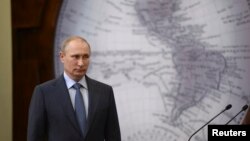Analysts say Moscow's decision to forgive most of North Korea's debt is aimed at clearing a path through the secretive state for a natural gas pipeline from Russia to South Korea.
Russian President Vladimir Putin last month forgave 90 percent of North Korea's $11 billion debt. He also allowed Pyongyang to use payments on its remaining debt balance for health, education and energy programs of its own.
Several experts say they believe this is an attempt by Russia to win favor with North Korea to get a pipeline agreement.
Scott Snyder, director of the Program on U.S. Korea Policy at the Council on Foreign Relations, said this is something Russia has long wanted. He said it was discussed "back in 2011 between then [Russian] President [Dmitry] Medvedev and [North Korean leader] Kim Jong Il.”
Synder added that it was again discussed by Russian President Vladimir Putin and South Korean President Park Geun-hye at a summit late last year. “So I think that there is interest on both the Russian and the South Korean sides in doing something,” he said.
International Investment Strategist Tom Elliot at the deVere Group's London office said the Russians are “very serious” about making this happen.
“You saw the keenness with which Putin followed up on a very long standing idea with China," Elliot said, adding that Beijing and Moscow reached an “agreement last month on running a gas pipeline into China.”
Elliott also explained how Russian efforts to find new energy markets accelerated after the West's negative reaction to the Kremlin's annexation of Crimea and current tensions in eastern Ukraine.
Snyder says North Korea also had motivations of its own to work with Russia on the debt issue, which has lingered since the fall of the Soviet Union.
This is "a way of clearing out the underbrush in order to draw in more Russian investment to North Korea,” he said.
North Korea only agreed to a repayment plan after Russia offered debt forgiveness and said payments on the balance could be spent by Pyongyang on domestic infrastructure programs.
According to various reports, North Korea's Soviet-era debt would be worth $238 million if valued at the current market price. But according to Elliott, North Korea agreed to the higher valuation in hopes of attracting future foreign investment.
Elliott explained, “If you're a country that actually wants to encourage international investment to grow ... you don’t want to be seen as buying up your debt on what’s called the secondary market at two cents on the dollar.” He said doing that "is considered very poor etiquette, indeed.”
Russian President Vladimir Putin last month forgave 90 percent of North Korea's $11 billion debt. He also allowed Pyongyang to use payments on its remaining debt balance for health, education and energy programs of its own.
Several experts say they believe this is an attempt by Russia to win favor with North Korea to get a pipeline agreement.
Scott Snyder, director of the Program on U.S. Korea Policy at the Council on Foreign Relations, said this is something Russia has long wanted. He said it was discussed "back in 2011 between then [Russian] President [Dmitry] Medvedev and [North Korean leader] Kim Jong Il.”
Synder added that it was again discussed by Russian President Vladimir Putin and South Korean President Park Geun-hye at a summit late last year. “So I think that there is interest on both the Russian and the South Korean sides in doing something,” he said.
International Investment Strategist Tom Elliot at the deVere Group's London office said the Russians are “very serious” about making this happen.
“You saw the keenness with which Putin followed up on a very long standing idea with China," Elliot said, adding that Beijing and Moscow reached an “agreement last month on running a gas pipeline into China.”
Elliott also explained how Russian efforts to find new energy markets accelerated after the West's negative reaction to the Kremlin's annexation of Crimea and current tensions in eastern Ukraine.
Snyder says North Korea also had motivations of its own to work with Russia on the debt issue, which has lingered since the fall of the Soviet Union.
This is "a way of clearing out the underbrush in order to draw in more Russian investment to North Korea,” he said.
North Korea only agreed to a repayment plan after Russia offered debt forgiveness and said payments on the balance could be spent by Pyongyang on domestic infrastructure programs.
According to various reports, North Korea's Soviet-era debt would be worth $238 million if valued at the current market price. But according to Elliott, North Korea agreed to the higher valuation in hopes of attracting future foreign investment.
Elliott explained, “If you're a country that actually wants to encourage international investment to grow ... you don’t want to be seen as buying up your debt on what’s called the secondary market at two cents on the dollar.” He said doing that "is considered very poor etiquette, indeed.”









